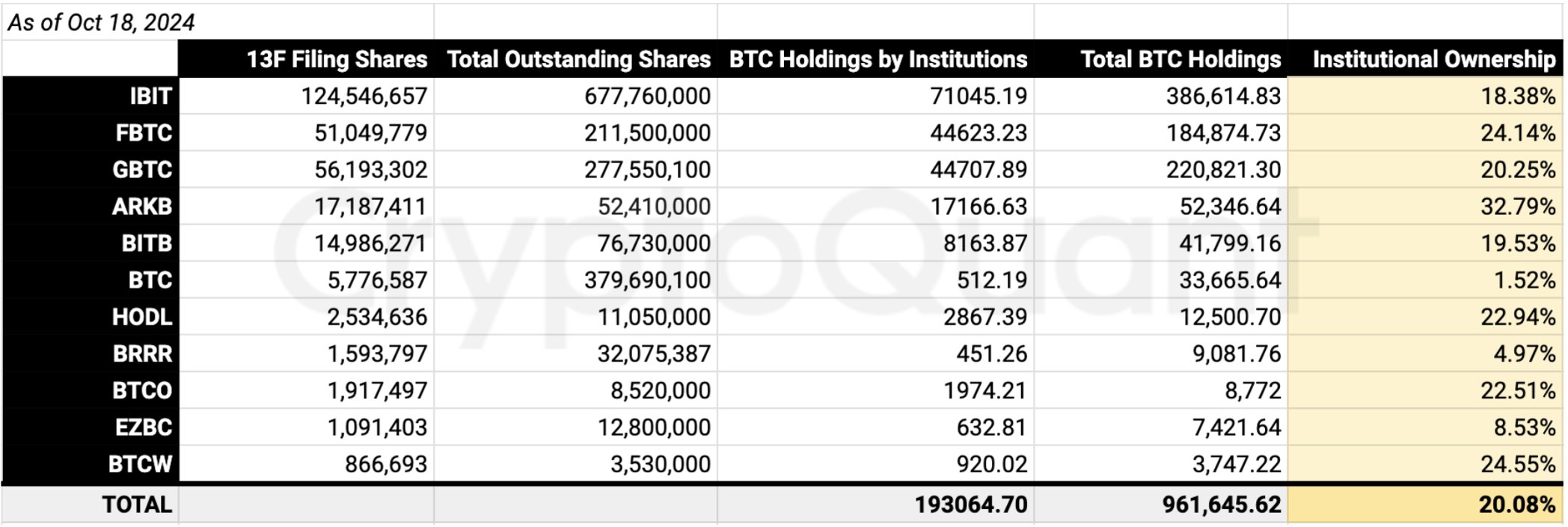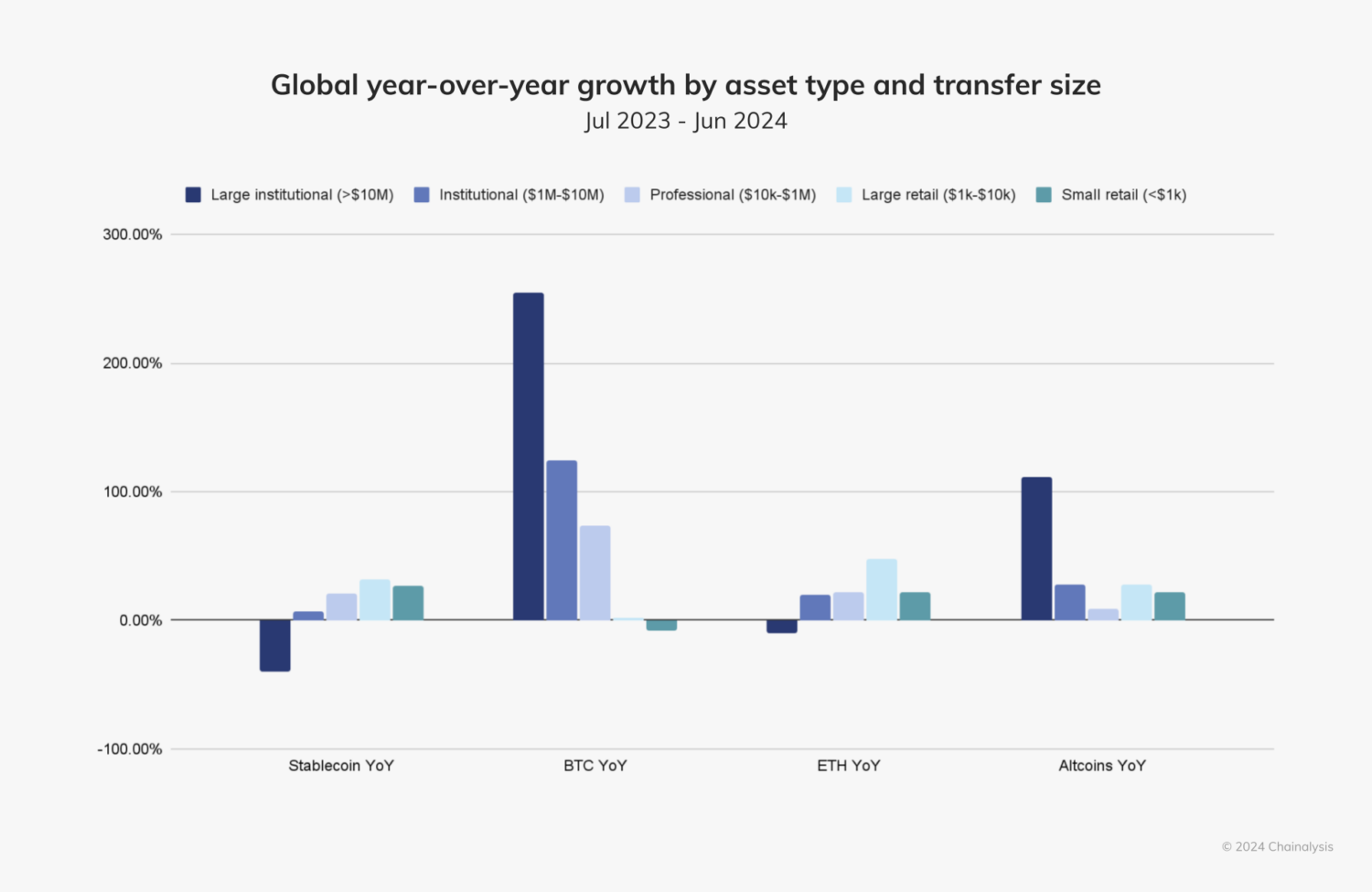Key Points
- New official reports reveal institutional ownership of US BTC ETFs at around 20%.
- Globally, the overall crypto adoption is led by Central and Southern Asia, and Oceania Region.
According to the latest reports, institutional crypto adoption is on the rise this year, especially following the launch of US-based Bitcoin ETFs.
Institutional Ownership of Bitcoin ETFs in the US
CryptoQuant’s CEO, Ki Young Ju, revealed via a recent post on X, that institutional ownership of US Bitcoin ETFs is now at around 20%.
According to official notes via Form 13F filings, asset managers are holding around 193,000 BTC with almost $13 billion at current BTC prices of around $67,000.
According to 13F filings as of October 18, BlackRock’s BTC ETF, IBIT, holds the most BTC coins at over 386 million coins, having an institutional ownership of over 18%.
Fidelity’s Bitcoin ETF, FBTC, holds almost 185 million BTC, with an institutional ownership of over 24%.
The highest institutional ownership is for Ark Invest and 21Shares’ Bitcoin ETF, ARKB, at almost 33%. The crypto product holds over 52,000 BTC.
According to Ki Young Ju’s post, which features data involving 11 BTC ETFs, institutions hold over 961,000 BTC, and the overall institutional ownership is listed at 20.08%.

The US crypto products listed in his post include IBIT, FBTC, GBTC, ARKB, BITB, HODL, BRRR, BTCO, EZBC, and BTCW.
Such impressive amounts of BTC held by institutions in the US highlight the growing crypto adoption, especially in 2024 since the Bitcoin ETFs were launched back in January.
Recently, they surpassed the impressive level of $20 billion. By comparison, gold required much more time to hit this level, as recently highlighted by Eric Balchunas from Bloomberg.
The rising institutional demand for Bitcoin highlights the recognition of Bitcoin’s potential as a strong hedge against inflation and market volatility.
Recently, Chainalysis released its 2024 Global Adoption Index report showing that the leaders in terms of global crypto adoption are currently Central and Southern Asia and Oceania (CSAO) Region.
They also mentioned US Bitcoin ETFs that triggered a surge in Bitcoin activity.
US BTC ETFs Triggered a Boost in Bitcoin Activity
As Chainalysis notes, the launch of the US crypto products triggered an increase in the total value of Bitcoin activity across all regions, and a particular YoY growth was seen in institutional-sized transfers and in regions with higher-income countries, including North America and Western Europe.
Bitcoin’s activity surpassed Ethereum, altcoins, and stablecoins in all categories except small and large retail.

Chainalysis notes that large institutions are the ones with over $10 million in transfers, institutional transfers are between $1 million and $10 million, professional transfers are between $10,000 and $1 million, and large retail transfers are between $1,000 and $10,000. Small retail transactions are the ones below $1,000.
Chainalysis 2024 Global Crypto Adoption
According to Chainalysis, 2024 Global Crypto Adoption Index Top 20, this year’s index is dominated by Central and Southern Asia and Oceania, with seven of the top 20 countries included in the list located in the regions.
The report notes that the closer the country’s final score is to 1, the higher its rank is.
Regionally speaking, the top includes India, Nigeria, Indonesia, the US, and Vietnam as the top five countries regarding crypto adoption in 2024.
India is number 1 regarding centralized service and retail centralized service. Indonesia ranks 1 at DeFi value and retail DeFi value.

Global Crypto Activity Is Increasing
According to Chainalysis’ report, between Q4 2023 and Q1 2024, the total value of global crypto activity has increased a lot, reaching higher levels compared to the ones in 2021 during the crypto bull market.
The report highlights the pattern in a chart where the firm added all 151 countries’ index scores for each quarter from Q3 2021 to Q2 2024 and reindexed them again to show global adoption over time.

The global index peaked in Q1 2024, coinciding with the launch of Bitcoin ETFs in the US.









